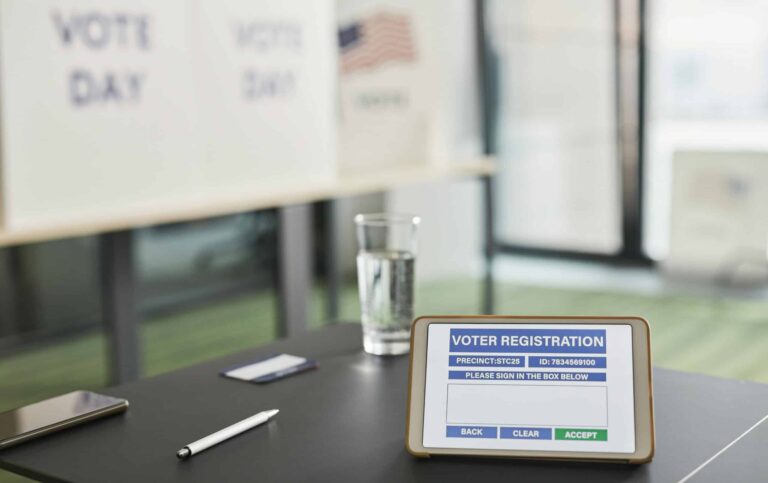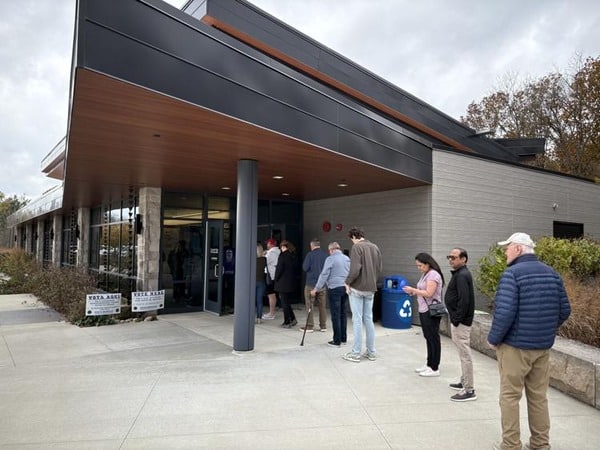
By Marilyn Odendahl
The Indiana Citizen
October 22, 2025
After warning lawmakers about potential litigation and sending two letters asserting the state is violating federal election laws, voting-rights advocates have filed a lawsuit against Indiana election officials over the state’s new proof-of-citizenship voting requirement.
The complaint, filed in the U.S. District Court for the Southern District of Indiana on Tuesday, asserts House Enrolled Act 1264 and House Enrolled Act 1680, both of which took effect on July 1, unfairly burden and potentially disenfranchise naturalized citizens in violation of the National Voter Registration Act of 1993 and the Civil Rights Act of 1964.
Provisions in those Indiana election laws rely on data from the Indiana Bureau of Motor Vehicles to crosscheck individuals with temporary credentials issued by the BMV against the state’s voter registration rolls in an effort to identify possible noncitizens who have registered to vote. The plaintiffs contend the information from the BMV is unreliable, since many naturalized citizens continue to use their temporary credentials after they become U.S. citizens because those credentials remain valid.
As a result, the plaintiffs argue, naturalized citizens will be required to prove their citizenship status in order to vote, while U.S.-born citizens will be able to register to vote and maintain their registration without having to show any proof of citizenship. Eligible voters could be wrongly removed from the voter rolls. Moreover, the new statutes are “redundant and unnecessary,” because Indiana laws and procedures prior to July 1 already prohibited noncitizens from registering to vote and required they affirm their citizenship under penalty of perjury, the plaintiffs assert.
“These laws put Indiana voters at risk, particularly our neighbors and members who have worked hard to become U.S. citizens and voters,” Linda Hanson, president of the League of Women Voters of Indiana, said in a statement. “Every Hoosier deserves an election system that treats all eligible voters fairly.”
Along with the League of Women Voters of Indiana, the other plaintiffs are Common Cause Indiana, Hoosier Asian American Power and Exodus Refugee Immigration. They are being represented by Bowman Legal Services in Indianapolis and the Chicago Lawyers’ Committee for Civil Rights and the Lawyers’ Committee for Civil Rights Under Law.
The defendants are Indiana Secretary of State Diego Morales and the co-directors of the Indiana Election Division, J. Bradley King and Angela M. Nussmeyer. Morales and King did not respond to a request for comment. Nussmeyer declined to comment on pending litigation.
The case is League of Women Voters of Indiana, et al. v. Diego Morales, in his official capacity as Secretary of State for Indiana, et al., 1:25-cv-02150.
In their lawsuit, the plaintiffs say the proof-of-citizenship requirement violates several sections of the NVRA, including the provisions that regulate the voter registration forms states use and those that require states use a “uniform (and) nondiscriminatory” method for maintaining an accurate and current voter registration list for federal elections.
Also, the plaintiffs argue, the citizenship provision violates the Civil Rights Act prohibition against any state having different standards, practices or procedures for determining whether certain individuals are eligible to vote.
The plaintiffs are asking the federal court to declare that the proof-of-citizenship provisions violate the NVRA and Civil Rights Act and are seeking an injunction to block the statutes from being enforced.
“New Americans have the same right to vote as native-born citizens,” Ryan Snow, counsel for the Voting Rights Project of the Lawyers’ Committee for Civil Right Under Law, said in a statement. “And yet Indiana has needlessly created a new barrier to voting for new citizens, one which no native-born citizen will ever be subjected to. This is discriminatory and violates federal law.”

HEA 1264 and HEA 1680, both authored by Rep. Timothy Wesco, R-Osceola, contain several provisions related to voting and elections. The proof-of-citizenship requirement for voters already registered was introduced in HEA 1264, which was passed by the legislature in 2024, while the requirement was expanded by HEA 1680, which was passed in 2025, to individuals who applied to register on or after July 1, 2025.
Echoing the same argument made by voter advocates when the bills were being debated by legislators, the plaintiffs contend the citizenship provision unfairly targets naturalized citizens. The BMV issues temporary driver’s licenses and identification cards to immigrants who have legal status but are not U.S. citizens. Under the new laws, individuals who are naturalized but still holding a temporary credential will be flagged and required to show their citizenship papers. Since native-born U.S. citizens do not have temporary credentials, they will not have to prove their citizenship to get placed and to remain on the state’s voter rolls.
Individuals who claim citizenship status but hold a temporary license or ID will have 30 days to show local election officials either a birth certificate, U.S. passport or certificate of naturalization. If they fail to produce documented proof within the allotted time, they will be removed from the voter rolls.
Registered voters who are erased from the rolls can appeal, but the statute does not provide any deadlines for the county election board to hear the matter or issue a decision. New registrants who have their applications rejected do not have an appeals process available.
The plaintiffs point out that the documents naturalized citizens will have to show in order to prove their citizenship are costly. Obtaining a copy of their certification of naturalization could cost $1,385, or $555 to replace or amend the certification. Also, the application and fees for a new passport can cost $165. On top of those fees and costs, these individuals will bear any additional costs for traveling and taking off work to obtain the documents.
In their lawsuit, the plaintiffs note what they fear many naturalized citizens will do when faced with these new obstacles. “For many individuals who have become U.S. citizens and who lack the (proof-of-citizenship documents), the costs in time and effort to obtain it, and then provide it to a county election official, will be substantial and result in many voters simply giving up and being disenfranchised.”
The lawsuit likely did not come as a surprise.
During a hearing on HEA 1264 in February 2024, Julia Vaughn, Common Cause Indiana executive director, told the Senate Elections Committee the law would be challenged in court. “You are certainly looking at a lawsuit, no doubt,” Vaughn said.
Also, the Chicago Lawyers’ Committee for Civil Rights, along with Common Cause Indiana and other voter advocacy groups, sent letters to Morales in April and July highlighting their concerns that the proof-of-citizenship provisions discriminated against naturalized citizens. The letters detailed the advocates’ allegations that the new laws violated the NVRA and warned litigation might follow if the alleged violations were not corrected within 90 days.
“There is no evidence of widespread noncitizen voting or attempts to register to vote in our elections,” Ami Gandhi, director of the Midwest Voting Rights Program with the Chicago Lawyers’ Committee for Civil Rights, said in a statement. “This will result in the wrongful disenfranchisement of eligible voters, many of whom are people of color.”
Morales has championed the proof-of-citizenship laws as helping to ensure only U.S. citizens are registered to vote in Indiana. In September he credited HEA 1264 with the discovery of one noncitizen on the Vigo County voter rolls. When the individual had been asked to provide documentation of his citizenship, he showed his Mexican passport and told local officials he was not a U.S. citizen.
In its two letters to Morales, the plaintiffs had also asked the defendants for records to identify Hoosiers at risk of losing their right to vote because of these new proof-of-citizenship laws. The plaintiffs wanted the list of registered voters who have temporary credentials, as well as communications and documents related to the implementation of the citizenship requirement and instructions for determining whether registered voters are naturalized citizens.
Morales has not produced any records, according to the plaintiffs, while the co-directors of the Indiana Election Division have turned over a little more than 14 documents, which included a PowerPoint presentation, a newsletter providing updates on election laws, and copies of the data-sharing agreement between the BMV, Secretary of State and the IED.
The plaintiffs claim the defendants have not complied with the NVRA’s public records provision. In their lawsuit, they are seeking several documents, including the list of registered voters who have received a notice to produce proof-of-citizenship documents, registered voters who have not responded to the notification, and individuals who attempted to register to vote but were required to provide citizenship papers.
“Many individuals Exodus has assisted to obtain citizenship over the years fled from countries where they never had the chance to participate in a democracy,” Cole Varga, CEO of Exodus Refugee Immigration, said in a statement. “We cannot allow their voices to be silenced again in Indiana.”
Dwight Adams, an editor and writer based in Indianapolis, edited this article. He is a former content editor, copy editor and digital producer at The Indianapolis Star and IndyStar.com, and worked as a planner for other newspapers, including the Louisville Courier Journal.
The Indiana Citizen is a nonpartisan, nonprofit platform dedicated to increasing the number of informed and engaged Hoosier citizens. We are operated by the Indiana Citizen Education Foundation, Inc., a 501(c)(3) public charity. For questions about the story, contact Marilyn Odendahl at marilyn.odendahl@indianacitizen.org.